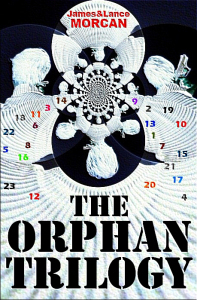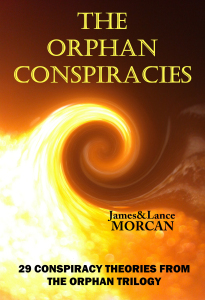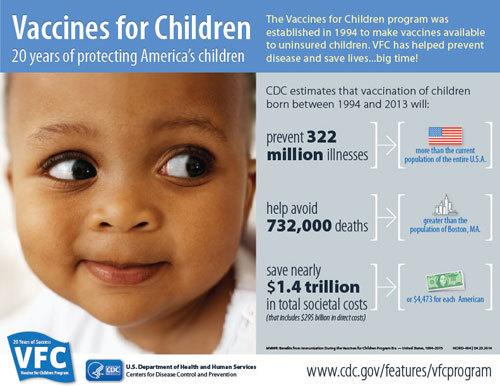Lance Morcan's Blog, page 60
August 14, 2015
James Morcan discusses Underground Knowledge on Boston’s Philosophic Perspectives Radio Show
Check out the video for the recent radio interview I did on Boston’s Philosophic Perspectives Radio Show with Arthur D. Schwartz.
The controversial subjects I discuss in this interview include false flag terrorism sponsored by Western governments, the Americanized Nazis involved in the CIA’s Operation Paperclip, suppressed technologies, and the world’s hidden system of finance involving undeclared fortunes.
Thanks guys n gals! James Morcan








August 12, 2015
Overprescribing blood pressure pills one of many medical issues aired in no-holds-barred book
Is it our imagination or are the goalposts for high blood pressure ever changing?
We address this issue in book three of our Underground Knowledge Series — MEDICAL INDUSTRIAL COMPLEX: The $ickness Industry, Big Pharma and Suppressed Cures. An excerpt from the book follows:
It doesn’t seem that long ago the “safe” systolic blood pressure (SBP) reading was your age + 100. So, for a 60-year-old, your SBP could be 160 over, say, 90 DBP (diastolic blood pressure) without your doctor suddenly becoming flustered and informing you a heart attack or stroke is imminent and immediately prescribing a lifetime course of BP medication.
Then the BP safety guideline dropped to 140 over 90. Imagine how many additional patients that little adjustment resulted in for doctors and medical centers. And perhaps more to the point, imagine how much in additional profits that yielded for the corner pharmacies and the big pharmaceutical companies.
Now all of a sudden – or since 2014 at least – the American Medical Association recommends drugs should be used to treat anyone aged 60 or over whose BP is 150/90 or higher.
That tidbit was gleaned from a February 5, 2014 article in JAMA, the Journal of the AMA. In that article, JAMA states the BP recommendation “is based on evidence statements…in which there is moderate- to high-quality evidence…that in the general population aged 60 years or older, treating high BP to a goal of lower than 150/90 mm Hg reduces stroke, heart failure, and coronary heart disease”.
Okay, so that’s a reversal of the downward trend we referred to, but it certainly fits the ‘moving goalposts’ analogy.
That said, we note the American Heart Association (AHA) recommends that BP for an adult aged 20 years or over “should normally be less than 120/80” and if your reading is 140/90 or higher “your doctor will likely want you to begin a treatment program”. That’s according to AHA’s heart.org website.
By its reckoning, about one in three American adults has high blood pressure. Little wonder given its BP parameters.
Here in New Zealand, our homeland, the Heart Foundation’s BP guideline for healthy adults, according to its website at heartfoundation.org.nz, should be below 140/85.
Back to the American Medical Association’s take on blood pressure – commenting on AMA’s new guidelines, WebMD, which promotes itself as “America’s healthy living magazine,” confirms on its website the AMA guideline sets a higher bar for treatment than the current guideline of 140/90.
WebMD quotes guidelines author Dr. Paul James as saying the recommendations are based on clinical evidence showing that stricter guidelines provided no additional benefit to patients. “We really couldn’t see additional health benefits by driving blood pressure lower than 150 in people over 60 (years of age)…It was very clear that 150 was the best number”.
We wonder how that went down with the drug companies? Not too well, we suspect. The 10-point upward adjustment of the SBP reading is no doubt costing them millions. Or should that read billions?
Certainly, the revised BP guidelines didn’t go down too well, according to WebMD, which reports the AHA expressed reservations. It quotes AHA president-elect Dr. Elliott Antman as saying the AHA is concerned that relaxing the recommendations may expose more persons to the problem of inadequately controlled BP.
Apparently, the AHA’s concerns aren’t shared by American local government and social issues reporter Aaron Kase who is highly critical of what he describes as the over-prescription of blood pressure meds.
Kase came to our attention courtesy of the American law site Lawyers.com, which ran an article first posted in Medical Malpractice on August 27, 2012. In that article, Kase (the author) states that, according to a new study, tens of millions of people taking BP medication prescribed by their doctors may be consuming the drugs for no reason.
“The report, which was conducted independently from any drug company money or influence, found the vast majority of people who take meds for hypertension (high blood pressure) see no benefit from them, and do not show reduced levels of heart attack or stroke”.
The article continues, “According to the Center for Disease Control, some 1 in 3 adults in America, or 68 million people, have high blood pressure. However, for most of them the condition is considered mild. Historically, even those mild cases are prescribed medication; but the study says the drugs do no good for mild hypertension and could cause harm to patients through side effects”.
Kase reports there are dozens of different medications prescribed for high BP, spread across a number of categories – each with its own side effects, ranging from constipation, excessive hair growth, erection problems, rashes and fever to heart palpitations and other adverse reactions.
“A tall price to pay, if the drugs aren’t actually helping people live longer,” he says.
The writer concludes that, unfortunately, big drugs are big business, and wherever money is involved, motivations can come into question when medications are prescribed to people who might not need them.
Such claims aren’t new of course. On January 8, 2012, the UK’s The Observer reported the BP bar was set at 140/90 whereas 15 years earlier the threshold was 160/100.
And way back in June 2005, The Seattle Times reported that, in recent years, expert panels from prestigious medical-research organizations such as the World Health Organization (WHO) and the federal National Institutes of Health (NIH) have called for lower thresholds for blood pressure – and, the report points out, “Behind each of those panels were the giant pharmaceutical companies that manufacture the new and expensive hypertension drugs”.
That report concludes, “The drug industry welcomed the new treatment guidelines and marketed them vigorously. Not surprisingly, as doctors followed the new guidelines and treated hypertension at lower readings, sales of the newer drugs increased”.

High BP is unquestionably a bigger problem in the West, and many experts attribute that to our higher consumption of salt.
This is touched on in The Observer article referred to earlier. It reports that Brazil’s Yanomami tribe, whose members eat a diet low in salt and saturated fat and high in fruit, have the lowest mean blood pressure of any population on earth – 95/61.
Nor, apparently, does their blood pressure increase with age. “By contrast, in the west, where people eat an average of 10-12 grams of salt per day, blood pressure rises with age by an average of 0.5mm Hg a year. That may not sound a lot, but over the average lifespan that is a difference of between 35 and 44mm Hg systolic”.
The article concludes that the most recent meta-analysis of trials involving more than 6000 people from around the world, found that a reduction in salt intake of just 2 grams a day reduced the risk of cardiovascular events by 20%.
That may well be the case although we suspect that applies to everyday table salt and not to pure, unadulterated, unrefined sea salt or Himalayan salt.
Even more depressing than our ever-increasing reliance on drugs to combat high blood pressure is the overprescribing and over-use of antidepressants – especially where children are concerned.
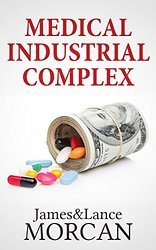
To read more about overprescribing blood pressure pills — and antidepressants too — you can find Medical Industrial Complex on Amazon. Go to: http://www.amazon.com/MEDICAL-INDUSTRIAL-COMPLEX-Suppressed-Underground-ebook/dp/B00Y8Y3TUM/
************************************************








August 9, 2015
In ‘The Orphan Uprising’ the agency takes his son. Uh oh…Big mistake!
In our top rating thriller novel THE ORPHAN UPRISING (The Orphan Trilogy, #3) our central character, the ninth-born orphan known as Nine, is forced out of retirement when his former masters at the Omega Agency abduct Francis, his young son.
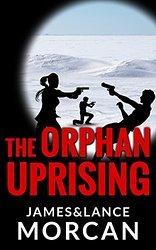
An excerpt from the novel follows. It describes the moment the former operative realises Francis is being abducted. The action takes place in the Marquesas Islands, in remote French Polynesia, where Nine and his wife Isabelle have been hiding out since dropping off the grid five years earlier. Nine is jogging high in the hills overlooking a picturesque bay in the tropical island he now calls home. These days, he exercises for the sake of his health as he has a relatively common heart condition called stenosis.
The excerpt follows:
Nine was following a well worn path that took him high into the steep hills overlooking Taiohae Bay. He could just make out his wife and son down near the waterfront. Francis was playing an impromptu game of soccer with his newfound friends while Isabelle and the other mothers sat in the shade, looking on.
The sweat was pouring off him as he ran up a steep incline. Sudden shortness of breath prompted him to slow to a walk. He thought nothing of it, putting it down to the heat. You’re getting old, Sebastian.
Still looking down at Taiohae Bay, he noticed an inflatable craft approaching the distant waterfront at speed. It was manned by two men and appeared to have come from a floatplane Nine had seen touch down on the water a short time earlier out in the bay. He watched as the inflatable nosed up onto the beach and two men jumped out. They began walking purposefully toward where Francis and the other children played.
Something about the pair bothered Nine. He couldn’t put his finger on it, but it didn’t seem right. Even from a distance, he could see the two weren’t your average tourists. Besides the dark sunglasses they wore, there wasn’t a camera, sun hat or beach towel in sight. They looked more like business executives in their white shirts and long, dark trousers. One even wore a tie.
Nine found himself growing apprehensive as he continued to watch the pair closely.
The former operative didn’t know it, but he wasn’t the only one observing the two men. His spiritual master, Luang, had noticed them around the same time Nine had. The elderly monk was watching from the entrance of the temple Nine and Francis had visited a short time earlier. Like Nine, he thought the two strangers seemed out of place.
Luang’s suspicions grew when the men purposefully marched up to one of the boys. He recognized the boy as Nine’s son. “Francis!” he shouted.
The boy, who was now playing quite close to the temple, looked at the monk and innocently waved.
Luang motioned to him with his hand. “Francis, come!” He motioned to him again.
Francis suddenly noticed the two strangers approaching. They were only a few yards away. Sensing they meant him harm, he sprinted toward the kindly monk and the sanctuary of the temple. The men began running after him.
Only now did Isabelle and the other mothers notice anything untoward from where they sat some distance away. Immediately concerned, they hurried to investigate. The island women began shouting at the strangers. Isabelle screamed when she realized it was Francis the men were chasing.
Fear drove Francis’ legs. The terrified boy ran as if his life depended on it. He reached Luang just before the strangers could catch him. The monk took Francis in his strong, wiry arms and threw him inside the temple. “Hide!” he ordered.
Francis ran to the rear of the temple and hid behind the statue of Buddha while Luang drew a long ceremonial sword from its scabbard that hung just inside the temple’s entrance. An exponent of the Muay Thai martial art, Luang was no slouch with a sword either – as the two strangers were about to find out.
The first man to enter the temple was the younger of the two. Confident the monk would offer no resistance, he hadn’t bothered to draw the pistol he carried on him as he stepped inside. He didn’t even see the steel blade that slashed his arm open to the bone. Screaming in pain, the wounded man threw himself to one side just in time to avoid a second slash that would have taken his head off.
Luang turned to face the second man too late to avoid the gunshot that ended his life. The monk was dead before he hit the temple’s concrete floor.
The sound of the gunshot galvanized Isabelle and the other women into action. Shouting to attract the attention of menfolk in the vicinity, they started running toward the temple. In her pregnant state, Isabelle was left far behind.
The women were still some distance from the temple when the older of the two men emerged with a struggling Francis under his arm. He was followed by the younger man whose wounded arm hung limply at his side. His once white shirt was blood-soaked. The older man pointed his pistol at the advancing women who by now were swearing obscenities at the pair. The sight of a pistol had no effect on the women, so he fired a warning shot above their heads, stopping them in their tracks.
Only Isabelle wasn’t deterred. “Francis!” she screamed as she ran toward the men whom she now knew were intent on abducting her son.
With a squirming Francis still under his arm, the older man ran off toward the beached inflatable craft, closely followed by his wounded partner.
“Mama!” Francis screamed.
Isabelle tripped and fell heavily. By the time she struggled to her feet, the men were already pushing their inflatable into the water. She was powerless to resist as they fired its engine into life and sped off toward the waiting floatplane.
“Mama!” Francis’ plaintiff cries reached his mother, but she was powerless to help.
High in the hills above the bay, Nine had started running as soon as the men began chasing after Francis. By the time they’d bundled the boy and their inflatable into the floatplane, Nine was already down at sea level and sprinting toward the waterfront. His lungs were burning and his legs felt like lead, but he ignored that. All he could think of was Francis.
The previous few minutes had seemed like a nightmare to Nine. There was no obvious explanation for what he’d just witnessed. Falling back on his training, his mind worked at a thousand clicks per second as he tried to figure out what was happening and who was behind it. It could only be Omega! He figured the Omega Agency must have discovered his whereabouts. But how? And why Francis? Why not me? There were so many questions and no answers.
Nine drove himself to run faster.
#
As he neared the waterfront, he felt a searing pain in his chest. Nine knew immediately what was happening. He was having the heart attack his specialist had warned he’d have if he overdid things.
Despite his condition, he had the presence of mind to note the description of the plane that was now taxiing out into deep water in preparation for take-off: it was a de Havilland Canada DHC-3 Otter floatplane of the type favored by the Air Command of the Canadian Forces because of its excellent search and rescue capabilities.
The floatplane was the last thing Nine saw before everything went black.
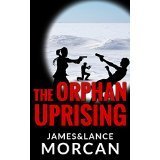
To read more about The Orphan Uprising go to Amazon: http://amazon.com/dp/B00BFC66DM/
********************************************************








August 5, 2015
Actor, Author and Film-Maker James Morcan speaks on society, his work, and how “Little Brother is always watching!”
 Originally posted on Paul Howsley:
Originally posted on Paul Howsley:
Today, I’m speaking to New Zealand-born actor/writer/producer James Morcan whose books include the thriller series The Orphan Trilogy and the controversial non-fiction Underground Knowledge Series. James’ most recent acting performance was a leading role in the post-Apocalyptic feature film ‘After Armageddon’ which he also wrote. The dystopian adventure film was shot in rural Australia in early 2015 and Morcan co-starred with Berynn Schwerdt (‘Wyrmwood’). His feature films have screened at cinemas in New Zealand, India, Australia, Italy and Cannes. Today though, I will be asking James about his latest work, his thoughts on society, and also what he has going on right now.
On what themes does your work cover and why did you choose those in particular?
The Underground Knowledge Series is an ongoing series of controversial non-fiction books I’m writing with my co-author, and father, Lance Morcan who is a former journalist and newspaper editor. Our titles span various subjects…
View original 1,758 more words








Adventure novel set in the lands of the First Nations people of the Pacific Northwest
“Many paddles, one canoe” –First Nations saying
In the following excerpt from our top rating new release adventure novel Into the Americas, we describe a bloody clash between two warring First Nations tribes of the Pacific Northwest during a hunting expedition in the territories of the fearsome Mowachahts.
Maquina led a six-strong hunting party into the hills behind Nootka village. His five companions included Peshwar, a forbidding headman whose reputation as a fearsome warrior rivalled that of the chief and extended far beyond the borders of the Mowachahts’ territory. All six hunters carried shiny, new muskets acquired in the previous day’s trade, and they were keen to put them to good use.
Ahead of them, in dense forest, an elk grazed. Something spooked him. He wasn’t sure what – a scent or a sound perhaps – and he took off.
Soon after, Maquina spotted the elk’s tracks and knelt down to study them. He then led his fellow hunters deeper into the trees at a fast trot.
Elsewhere in the forest, the same elk burst into a clearing, disturbing a twelve-strong war party of Haachaht warriors, traditional enemies of the Mowachahts. They carried bows, tomahawks and other traditional weapons, and wore the grotesque wolf’s brow mask associated with their tribe.
The Haachahts’ chief, Callicum, a stocky man who wore a large nose-ring, stared into the surrounding trees. He flashed a hand signal at his warriors and they quickly dispersed. Now hidden from sight, they could hear the Mowachaht hunters moving through the undergrowth in pursuit of the elk.
Reaching the forest clearing, the Mowachahts stopped to study their quarry’s tracks. Maquina’s eyes were drawn to an eagle circling high above. He stared at the bird for a few seconds before returning his gaze to the trees. Sensing danger, he primed his musket. His fellow hunters followed suite.
A Haachaht bowman stepped out from behind a tree and aimed an arrow directly at Maquina. The bowman held his bow horizontal, in the manner of the indigenous people of the west coast. Maquina dropped to one knee and swung his musket up just as the bowman loosed his arrow. The arrow lodged in the throat of a tall Mowachaht standing directly behind Maquina. Mortally wounded, the warrior collapsed, choking on his own blood. Maquina killed the bowman with one well placed shot.
Haachaht war cries rang out as Callicum led his warriors out from the trees. Another arrow found its mark, killing a young Mowachaht. Reduced to four, the remaining Mowachahts fought like men possessed.
Two Haachahts closed in on Peshwar. He aimed his musket at the nearest of the two. A hollow click signalled it had malfunctioned. Cursing, Peshwar threw his musket aside and drew his tomahawk. “Peshak!” he swore as he grappled with his enemies. With two mighty swings of his tomahawk, the two Haachahts lay dead at his feet, their heads almost severed from their bodies.
As the fight escalated, a short Mowachaht aimed his musket at a burly Haachaht who rushed him, club in hand. His musket also misfired and he was clubbed to the ground. The Haachaht finished him off before he was felled by a musket shot.
Nearby, Maquina found himself fighting alongside Peshwar. “The muskets are faulty!” Maquina shouted.
Peshwar nodded. “The White-Faces have deceived us!”
The chief found himself face-to-face with Callicum who charged him with a tomahawk in each hand. Maquina raised his musket and pulled the trigger. This time his weapon misfired. Before he could reload, the Haachaht chief was onto him. Maquina was forced to back-peddle and use his musket to block his attacker’s blows. Peshwar came to his aid, wounding Callicum with his own tomahawk.
Seeing their chief in trouble, the other Haachahts seemed unsure what to do next.
Maquina and Peshwar took advantage of their enemies’ indecision and fled, dragging with them the other surviving hunter.
As they made good their escape, Maquina was consumed by the anger he felt toward the European traders. Yet again his people had fallen foul of the traders’ unscrupulous ways. On this occasion, faulty muskets had contributed to the deaths of three of his finest warriors.
You have been reading an excerpt from INTO THE AMERICAS (A novel based on a true story). To read more go to Amazon: http://www.amazon.com/Into-Americas-novel-based-story-ebook/dp/B00YJKM51E/

★★★★★ “Highly recommended.” – Amazon reviewer Cheryl Long
******************************************
August 2, 2015
Are those who do not vaccinate their own children putting other children, and society as a whole, at risk?
It’s worth noting that not all who are opposed to the vaccine law reforms being considered in California, the US and elsewhere in the world are against child immunizations. As we point out in our new book MEDICAL INDUSTRIAL COMPLEX: The $ickness Industry, Big Pharma and Suppressed Cures, some (anti) campaigners have either had their own children vaccinated or have advised other parents to vaccinate, but also argue that making immunizations mandatory is unconstitutional and against citizens’ medical freedom.
Further to our recent blog on this very subject, here’s another excerpt from Medical Industrial Complex:
Are those who do not vaccinate their own children putting other children, and society as a whole, at risk?
We cannot confidently answer that. Nor, it appears, can anyone. Not with any degree of certainty.
Added to the difficulty of sourcing accurate research and reliable statistics is the problem of widespread corruption highlighted in earlier chapters. Sad but unsurprising in any industry as profitable as Big Pharma.
A February 15, 2015 article about vaccines, published on the Collective Evolution website and written by Arjun Walia, nicely summarizes a global trend. Headlined ‘The Top 6 Reasons Why Parents Are Choosing Not To Vaccinate Their Kids’, the article quotes Walia as saying, “More and more parents around the globe are choosing to opt out of vaccinating themselves and their children”.
The article continues, “As a result of this trend that’s been gaining more and more momentum, a harsh response has come from the ‘pro-vaccine’ community-criticizing parents for their decision to not vaccinate. At the end of the day it’s not really about ‘pro-vaccination’ or ‘anti-vaccination,’ it’s not one ‘against’ the other or about pointing fingers and judgement, it’s simply about looking at all of the information from a neutral standpoint. It’s about asking questions and communicating so people can make the best possible decisions for themselves and their children.
“Parents love their kids and the vaccine ‘controversy’ has made it difficult for many parents to know what to do”.
Walia says, “Parents who are choosing not to vaccinate their children are not just doing it based on belief, they are doing it based on science and information. This science and information is nowhere near emphasized to the point where the science and information on the other side of the coin is (‘pro vaccine’).
“Parents who choose not to vaccinate themselves or their children are clearly intelligent, and they should not be made to look like fools. On the other hand, parents who are choosing to vaccinate their children are also intelligent.
“Those who choose to vaccinate should not be made out to be the ones who have made the ‘right’ decision when there is evidence on both sides of the coin that clearly shows parents who are not vaccinating their children could also be making the ‘right’ decision”.
The article lists (as follows) the top six reasons parents choose not to vaccinate their kids:
The Vaccine/Autism Controversy
Scientific/Industry Fraud
The National Childhood Vaccine Injury Act
The Ineffectiveness Of Some Vaccines And Vaccine Injury
Vaccine Ingredients
Vaccine Safety Evidence Is Not Rock Solid. One Size Does Not Fit All.
In his conclusion, Walia presents a fairly balanced argument that suggests it’s time to open up the debate as currently the pro-vaccination lobby is the only one that’s being given airtime in the mainstream media.
Besides the fact that pharmaceutical companies cannot be trusted, the other aspect in the equation is that virtually all vaccines are loaded with chemicals and other poisons.
Here’s a rundown on some of the damaging ingredients in vaccines on the market today, as listed on the Healthy Home Economist website in a 2015 article:
“MSG, antifreeze, phenol (used as a disinfectant), formaldehyde (cancer causing and used to embalm), aluminum (associated with alzheimer’s disease and seizures), glycerin (toxic to the kidney, liver, can cause lung damage, gastrointestinal damage and death), lead, cadmium, sulfates, yeast proteins, antibiotics, acetone (used in nail polish remover), neomycin and streptomycin. And the ingredient making the press is thimerosol (more toxic than mercury, a preservative still used in many vaccines, not easily eliminated, can cause severe neurological damage as well as other life threatening autoimmune disease). These vaccines are grown and strained through animal or human tissue, like monkey and dog kidney tissue, chick embryo, calf serum, human diploid cells (the dissected organs of aborted fetuses), pig blood, horse blood and rabbit brain.”
The article also states that other countries are waking up to the dangers of vaccines. “In 1975, Japan raised its minimum vaccination age to two years. The country’s infant mortality subsequently plummeted to such low levels that Japan now enjoys one of the lowest levels in the Western world (#3 at last look). In comparison, the United States’ infant mortality rate is #33.
(It should be mentioned the Japanese ruling has since been amended. According to the Vaccination Liberation-Information site, Japan’s health authorities now recommend six vaccinations via injection in the first year of life, and three more in the second year. That, according to the same source, compares to 20 vaccinations in the first two years of life of most American children).
The Healthy Home Economist article continues, “In Australia, the flu vaccine was recently suspended (April 2010) for children under 5 because an alarming number of children were showing up in the emergency rooms with febrile convulsions or other vaccine reactions within hours of getting this shot”.
After researching the pros and cons of immunizations, and listening to all sides of the debate, we still have NO IDEA what the best decision is for parents to make regarding that most tricky of questions – to vaccinate or not to vaccinate.
However, we do agree there needs to be a wider public debate as this issue ain’t necessarily as cut and dried as Big Pharma and others in the Medical Industrial Complex would have us believe.
As with many cases involving extreme or polarizing points of view, we suspect the truth regarding child immunizations is probably somewhere in the middle ground. We also disregard (and recommend you do, too) the “evil mega conspiracy” implications some anti-vaccine campaigners trot out just as we disregard the “science is already 100% proven and safe” claims the pro-vaccine lobby loudly trumpets.
We also think that, at the very least, those adults who are happy to vaccinate their children should be demanding en masse that pharmaceutical companies remove all the toxic chemicals and other poisons that are loaded in these vaccines. When you scan the ingredients, which read like they belong in a can of household paint, it’s obvious these things just cannot be good for the health and wellbeing of a child’s brain or body!
For all we know it may be better for a child to be subjected to all these doses of chemicals and poisons than risk contracting serious diseases like polio, but does that make it right? And is everything that can be done, being done, to make vaccines’ ingredients less toxic and safer?
It’s unfortunate that only a small percentage of the public are aware of what exactly is in vaccines. If more people were made aware, and if enough demanded less poisonous vaccines, then Big Pharma would be forced to change.
Boycotting products and putting public pressure on corporations and governments can be a very effective way to enforce change. Ultimately, the power rests with the people – the 99 percent.
If enough demand change, it will happen. And it does seem at least some changes are needed in this most vexing of issues – the vaccination of our children.
You have been reading an excerpt from Medical Industrial Complex. To view the book on Amazon go to: http://www.amazon.com/MEDICAL-INDUSTRIAL-COMPLEX-Suppressed-Underground-ebook/dp/B00Y8Y3TUM/

************************
July 31, 2015
Interim poll results show most mistrust accuracy of annual Forbes Rich Lists
Do you believe the likes of Bill Gates & Warren Buffett are the richest people in the world as per the annual Forbes Rich Lists? Or do you believe there is a hidden world of ‘black money’ involving elite individuals with undeclared fortunes that would dwarf those earned by the likes of Gates & Buffett?
That’s the question we’ve put to members of our Underground Knowledge discussion group in our latest poll on Goodreads.com – and so far 79% say they believe there are individuals with fortunes greater than those listed at the top of Forbes Rich Lists.
Only 9% of poll respondents indicate they believe the estimates on the Forbes Rich Lists are roughly correct while 12% are unsure.
A random sample of respondents’ comments follow:
We are living in an illusion after the Riemann shock. The paper money has no meaning now except for our common life in the world. In fact, the present world economy is in the bankrupt state and this evidence has been concealed from our public eyes. Hence Forbes rich list has no meaning but most of us believe that it is true. Maybe great catastrophe of economy will be happened in the near future. How can we survive in this great catastophe?
Not a case of “i believe there are people more wealthy””, i know there are people far more wealthy!!
I suspect Putin may be the richest person in the world. Yet he is not on any list.
The wealth of the Rothschild family is beyond comprehension or valuation!!
In our modern society, scientists invented a monster called financial engineering. It makes the total debt of our society to reach to an unimaginable level. No one in the world knows what is its total amount. Now we are living on the verge of money crisis. Even the wealth of Rothchild family or Royal family cannnot stop this catastrophe.
Lets put it this way, if they all donated just 1% of their money to alleviating poverty, hunger and disease around the world, there would not be children dying every few minutes of malnutrition, water borne diseases, malaria and multiple other reasons. One has only to wonder, “do they want them to die, or are they just so insular and ignorant, that they just don’t care?”
There are others, more secretive, whose financial empires are bigger than the Rothschilds (in my humble opinion). The world of ‘black money’ is like an onion or a Russian doll where you keep peeling back the layers of wealth and each layer is more and more hidden with greater and greater wealth…
Poll ends August 8. To view all the comments, or better still to have YOUR say, go to: https://www.goodreads.com/poll/list/142309-underground-knowledge—a-discussion-group?type=group
While you’re at it, check out the results of our other polls, too.
These include:
Do you believe World Trade Center 7 (aka Building 7), which no plane hit on 9/11, collapsed solely due to fires as per the official story?
Do you believe A.I. (artificial intelligence) will ever be more advanced/sophisticated than human intelligence?
Do you believe Princess Diana was murdered?
Do you believe Capitalism should be restructured, replaced by another economic system or left exactly as is?
Do you believe classified mind control technologies are being used by governments on innocent citizens?
Do you believe time travel is possible?
Do you believe genius-level intelligence is primarily the result of nature (genes) or nurture (education, environment, parenting etc)?
Do you believe Jesus Christ was a real historical person?
Do you believe Robert (Bobby) F. Kennedy (RFK) was solely killed by the “lone gunman” Sirhan Sirhan?
#
Our Underground Knowledge discussion group is aimed at those with an interest in the world we live in and a desire to learn or to uncover “underground knowledge” on important issues of our times.
Everyone’s welcome to join! All you need is an enquiring mind and a desire to learn. Our members include scientists, social activists, teachers, historians, authors, former military and intelligence agency personnel, bankers, housewives, whistleblowers, students, former police officers, journalists, readers and many more.
Visit the Underground Knowledge discussion group at: https://www.goodreads.com/group/show/142309-underground-knowledge—a-discussion-group
**************************************








July 30, 2015
First Nations trading ventures brought to life in new release adventure novel
In the following excerpt from our new adventure novel Into the Americas, we describe trading between the Mowachaht tribe and unscrupulous white traders in Nootka Sound, on Vancouver Island, in the early 1800’s.

In the skies above North America’s west coast, amongst the clouds, a bald eagle glided in lazy circles. With her magnificent white head and tail feathers, and her six-foot wingspan, she was the queen of her domain as she made use of the thermals that rose from the unseen terrain below.
The clouds parted to reveal a village – one of many populated by the indigenous people of the remote Northwest Pacific region. Nootka village was bordered by rugged, forest-covered hills which rose up out of the sea. Comprised of twenty or so large, wooden lodges, it was home to the Mowachaht tribe, one of the twenty-five Nuu-chah-nulth indigenous groups that occupied the region’s craggy coastline. A two-masted schooner lay at anchor offshore, safe for the moment in an inlet with the unlikely name of Friendly Cove.
Distance was no problem for the eagle whose sharp eyesight could distinguish any object from another, even if those objects were little bigger than a pinhead. Right now, her eyes were focused on a Chinook salmon swimming between the schooner and shore. The eagle flattened her wings and dove head first, extending her wings moments before she struck the water. Talons extended and now in a shallow dive, the eagle grasped the salmon and, with a few mighty beats of her wings, rose sluggishly skyward with her catch.
The eagle’s labored flight took her directly over the village. If any of the villagers had been waiting for her, with bow or musket primed, they’d have shot her down easily for she was as yet barely higher than the colorful totem poles that lined the shore. Fortunately for her, eagles were sacred to these people and so they ruled the skies with impunity.
A trade was going down with a dozen crewmen from the schooner. Unkempt and ill disciplined, the crewmen were typical of the freebooters who visited these shores in increasing numbers. They carried with them an assortment of weapons and were clearly no strangers to violence.
Armed Mowachaht warriors, ever-mindful of bad experiences they’d had with other European traders, kept a wary eye on the visitors. Most were armed with muskets, some carried blunderbusses and a few bore traditional weapons, including clubs, spears and tomahawks.
The traders had come to exchange muskets for sea-otter pelts. Much sought-after, the beautiful pelts fetched a princely sum in the civilized world – especially in London and in Macau, China. Consequently, Nootka village and the sound named after it was an increasingly popular port of call for traders intent on filling their ships’ holds with the bounty of the New World.
Most of Nootka’s fifteen hundred residents were present to observe the trade, which was being conducted on a sandy beach in front of the village. Trading, especially with visiting Europeans, was a highlight of their short, hard lives. More so after the long winter months – as was the case on this pleasant spring day.
Among the Mowachahts, the common or untitled people wore sealskin and coarse cedar bark clothing, which afforded protection from the constant rain in these parts. The chiefs and men and women of high ranking wore animal skins and colorful capes or, in rare cases, the pelt of the sea-otter.
Headmen invariably wore the striking black sea otter pelt. It extended to the knees and was fastened around the waist by a wide band of colorful, woven cedar bark. The warriors wore square-cut, yellow mantles with holes cut for the arms – similar to those worn by the commoners except theirs were dyed red and were more basic.
Absent from the trading activities were the Mowachahts’ slaves. Acquired in raids on neighboring tribes, the slaves were readily identifiable as such as they collected firewood and performed other menial tasks in and around the village. Though they spoke the same Wakashan language as their Mowachaht masters, their appearance was quite different: each bore the physical characteristics of his or her tribe. Some were lighter skinned, others darker; some were tall and slender, others short and stocky; some male slaves were bald or wore their hair short, others wore their hair in long ringlets; most wore raggedy sealskin clothing while some were near-naked. Their number included almost as many females as males – the former more often than not serving as sex slaves as well as manual workers.
Above the beach, the Mowachahts’ lodges extended to the tree line. They were a sprawling collection of wooden dwellings, the remnants of a Spanish trading outpost vacated some years earlier. Smoke from cooking fires curled up into the sky from strategically placed openings in the lodges’ roofs.
The totem poles – some even taller than the surrounding fir trees – towered over the lodges.
On the beach, there was an air of tension as the schooner’s master, Captain Alvin Walsh, an abrasive New Yorker with a well deserved reputation for dishonest trades, bargained with a group of headmen. Foremost among the latter was Maquina, chief of the Mowachahts. Tall, bronze and muscular, the middle-aged Maquina cut an impressive figure in his ceremonial cloak. Feathers protruded from his long, black hair, which he wore as a bun on top of his head. Like all the headmen, white down covered his head and shoulders, conveying the impression of falling snow.
Captain Walsh’s steely gaze was fixed on the bundles of pelts that lay at his feet while Maquina’s hawk-like eyes were fixed on a dozen new muskets stacked end-to-end in an open casket. The casket lay on top of five identical unopened caskets.
Hard-nosed bartering had begun soon after the traders had stepped ashore earlier in the day and, to both parties, it seemed a successful trade was no closer. Tempers were becoming frayed.
Maquina pointed at the caskets and, in broken English, said, “Maquina say…five pelts…one musket.”
Walsh shook his head. “One musket…ten pelts.” He appeared ready to depart, a shrewd strategy he’d fine-tuned years earlier when trading watered-down whisky to the East Coast tribes.
The chief quickly nodded to his opposite, indicating they had a deal. Walsh gestured to his men who immediately began scooping up bundles of pelts.
Maquina intervened. “Try musket first,” he said.
Walsh cursed under his breath as he motioned to his men to hold off for the moment. He then selected a musket from the open casket and handed it to Maquina. The shrewd chief ignored the offering and selected another musket. He expertly primed it and fired it into the air. The shot echoed throughout Nootka Sound. Still suspicious, Maquina broke open another casket. He tested a second musket with the same result. Satisfied, he made the faintest of hand gestures to his warriors who immediately uplifted the caskets and carried them away.
A relieved Walsh motioned to his men to resume gathering up the pelts. Under Maquina’s penetrating gaze, the captain appeared tense and he exhorted his men to hurry.
There was good reason for Maquina’s suspicion. The Mowachahts – like all members of the wider Nuu-chah-nulth community – had been short-changed, and worse, by European traders. As the number of visiting trading vessels increased, so too had the number of unsavory incidents. The indiscriminate shooting of villagers by drunk or disgruntled traders was becoming almost commonplace and the rape and mistreatment of women even more so.
And so it was with some malevolence that Maquina and his people observed these latest traders as they ferried their trade items back to the waiting ship.
You have been reading an excerpt from INTO THE AMERICAS (A novel based on a true story). To read more go to Amazon: http://www.amazon.com/Into-Americas-novel-based-story-ebook/dp/B00YJKM51E/

******************************************








July 27, 2015
Thriller novel The Ninth Orphan re-enters Amazon’s bestseller lists
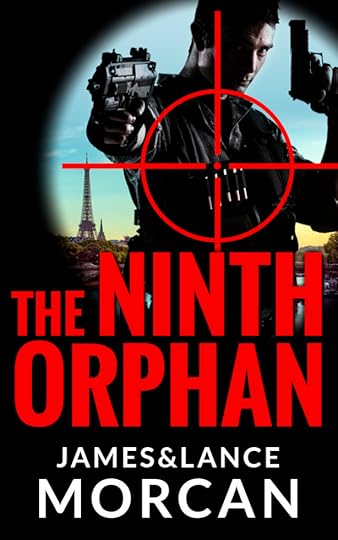
Out of 7 million+ book titles on Amazon, it’s ranked as of this evening in the top 4,000. http://www.amazon.com/dp/B0056I4FKC
Here’s its current sales ranking:
Amazon Best Sellers Rank: #3,590 Paid in Kindle Store (See Top 100 Paid in Kindle Store)
#8 in Kindle Store > Kindle eBooks > Mystery, Thriller & Suspense > Thrillers > Pulp
#19 in Kindle Store > Kindle eBooks > Mystery, Thriller & Suspense > Thrillers > Assassinations
#20 in Books > Mystery, Thriller & Suspense > Thrillers & Suspense > Spies & Politics > Assassinations
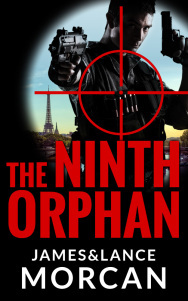
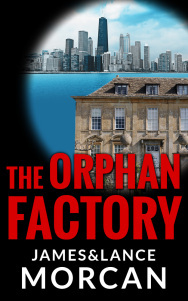
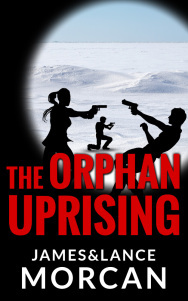
Thanks to everyone who has read The Ninth Orphan or supported the trilogy in other ways!
Regards,
James Morcan








July 26, 2015
Vaccinating children – Is it the smart thing for parents to do?
Can society trust the big pharmaceutical companies enough to be sure child immunizations are not dangerous – especially in the light of the alarmingly long list of proven fraudulent activities of many of those same companies? We attempt to answer that question in our book MEDICAL INDUSTRIAL COMPLEX: The $ickness Industry, Big Pharma and Suppressed Cures.
We also ask is there any limit to the lengths drug companies will go to in order to maximize revenue? And if adult lives aren’t safe in this mad pursuit of profits, can we be certain children’s lives won’t be viewed as expendable as well?
But surely they wouldn’t suppress scientific evidence of vaccine dangers when it comes to children? you may ask. Surely they wouldn’t go that far? Right?
Well, you may be right, but let’s break things down a little before reaching any conclusions.
Firstly, it’s an indisputable fact that immunizations protect many millions of children every year from potentially deadly diseases, and they save countless lives. It is undeniable that vaccines have all but eradicated a whole host of serious diseases including diphtheria, rubella and smallpox. Polio was also on that list although, alarmingly, it has reportedly been making a comeback in recent years.
Given the apparent overwhelming scientific evidence proving the effectiveness of child immunizations, in legal parlance this seems like it should be case closed. However, not all parents, and more significantly not all health industry professionals, agree it’s as simple an issue as that. Indeed, some doctors, nurses and other health professionals argue the underreported risks of vaccinating infants far outweigh the protection they provide against certain diseases.
At the time of writing, Californian politicians were considering passing a new law – Senate Bill 277 (SB 277) – making it mandatory for Californian residents to vaccinate their children. As you can imagine, this hasn’t gone down well with everyone.
Taking away parents’ ability to choose has stirred up the vaccine debate once more – especially in alternative media.
On April 23, 2015, the healthy living website Elephant ran an article by health campaigner Elliot Freed, commenting on the issues at stake. In it, Freed hints at complexities that go beyond whether vaccines are safe and effective, stating, “In 1986 vaccine manufacturers were given financial immunity from the damages of their products by congress”.
It turns out that law change led to a program that’s funded by a 75 cent levy on every vaccine sold.
The article heavily implies that through this legal and/or political loophole, drug companies can repeatedly dodge most claims which attempt to establish a link between vaccines and injury to children.
The Elephant article also mentions how more child vaccines than ever contain disease-producing pathogens – more so since liability was eliminated for drug companies producing vaccines. The list of vaccines containing pathogens, according to the article, includes “the MMR, the dTap and the oral polio vaccine”.
Because of the financial immunity in the production of vaccines, pharmaceutical manufacturers are now much more focused on developing vaccines than drugs. Easy to understand why: it’s a lower risk activity.
Freed continues, “Drugs go through a more rigorous testing process. They are then optional for consumers and consumers and governments can sue pharmaceutical companies for damages caused by the drugs. Vaccines are subject to a less rigorous testing process, saving millions of dollars for each drug sold as a vaccine.”
And of course, vaccines need far less advertising costs – especially when governments make their usage mandatory.
“This is not about vaccines for diseases like polio or measles,” Freed says. He goes on to predict that many other future vaccines will become mandatory as well. “Where are the infectious epidemics that are killing our children? I don’t see them”.
If the bill (SB 277) passes, according to Freed, “No state legislator, no school administrator, no doctor and no parent will be able to say no to any chemical mandated by the federal government to be injected into children, so long as it is packaged as a ‘vaccine’”.
Is this paranoia? Unfounded speculation? A theory only tinfoil hat-wearing conspiracy theorists would believe?
Not according to RFK’s son, Robert F. Kennedy, Jr., who has warned the public that a medically induced ‘holocaust’ is now upon us…
You have been reading an excerpt from Medical Industrial Complex. To view the book on Amazon go to: http://www.amazon.com/MEDICAL-INDUSTRIAL-COMPLEX-Suppressed-Underground-ebook/dp/B00Y8Y3TUM/

*****************************************************
































